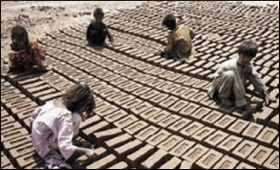|

|
Parliament amends child labour Bill for kids below 14
|
|

|
|
| Top Stories |
 |
|
|
|
SME Times News Bureau | 27 Jul, 2016
The Parliament on Tuesday passed the Child Labour (Prohibition and Regulation) Amendment Bill, 2016, seeking to prohibits employment of children below 14 years in any "profession" but allows "home-based work", such as helping their families in forests, agricultural fields and small family-run units with the Lok Sabha giving its nod.
"This bill is historic and will go a long way in curbing the menace of child labour. For the first time we have also ensured that adolescents between the age group of 14 and 18 years cannot be employed in any hazardous work," Union Labour Minister Bandaru Dattatreya said in Lok Sabha pushing for its passage.
The Rajya Sabha had passed the bill last week.
The new amendments brought in this bill were "essential", the minister said, adding that the bill in no way discourages children from going to school.
Among other things, the new changes in the bill include heftier penalties on violators - jail term of six months to two years, from the earlier three months to one-year term, and a fine of Rs 20,000-Rs 50,000, up from Rs 10,000-Rs 20,000.
"We have also brought in the element of cognizable offence for the first time," Dattatreya said, countering Congress floor leader Mallikarjun Kharge, also a former Labour Minister.
The Minister asserted that under the provisions of the new law, "Employer, who violates the provisions of this Act, will be highly punished. The punishment will be stricter. It is a deterrent one. We have made it cognizable. Earlier it was non-cognizable, now it was made a cognizable offence."
Among others Ranjit Ranjan (Congress), Virendra Kumar (BJP), N.K. Premchadran (RSP) and C. Gopalkrishnan (AIADMK) also participated in the debate.
Kalyan Banerjee of Trinamool said "Child labourers can be found in urban dwellings, around 80 per cent reside in rural areas where they are forced to work in agricultural activities such as tanning, livestock, rearing, forestry and fisheries."
Kalikesh Singh Deo (Biju Janata Dal), however, demanded that the bill be referred to a select committee of the House for wider consultation.
Kharge maintained that the 2012 bill brought in by the UPA regime was good enough and the new amendments would not serve any purpose.
The charge was, however, strongly contested by Dattatreya.
Replying to questions raised by Trinamool Congress member Kalyan Banerjee and Biju Janata Dal member Kalikesh Singh Deo, the Minister said the government has carefully defined "family" in relation to a child, that would include a child's "mother, father, brother, sister and father's sister and brother and mother's sister and brother".
Singh Deo, the MP from Bolangir in Odisha, had during the debate argued that some "uncles and Mamaji" can misuse this definition.
On this Dattatreya said, "In India often children after the unfortunate death of their parents are looked after by their close relatives and are dependent on them".
The new law would also apply to those who work "as artists" in an audio-visual entertainment industry, including advertisement, films, television serials or any such other entertainment or sports activities except the circus, he said.
The safety measures have to be maintained, he said adding that "no such work shall effect the school education of the child".
Kharge complained against a clause which says the central government may at times "specify the nature of the non-hazardous work to which an adolescent may be permitted to work".
Among other features of the new bill, Dattatreya said it has been "linked to the Right to Education Act of 2009" so that every child should go to the schools.
Later the House passed the bill by voice vote after the amendments moved by several opposition members were either withdrawn or negated.
|
|
|
| |
|
|
|
|
|
|
|
|
|
|
|
|
|
|
| |
| Customs Exchange Rates |
| Currency |
Import |
Export |
US Dollar
|
66.20
|
64.50 |
UK Pound
|
87.50
|
84.65 |
Euro
|
78.25
|
75.65 |
| Japanese
Yen |
58.85 |
56.85 |
| As on 13 Aug, 2022 |
|
|
| Daily Poll |
 |
 |
| PM Modi's recent US visit to redefine India-US bilateral relations |
|
|
|
|
|
| Commented Stories |
 |
|
|
|
|
|
| |
|